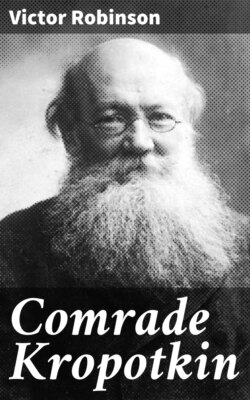Читать книгу Comrade Kropotkin - Victor Robinson - Страница 10
На сайте Литреса книга снята с продажи.
THE NIHILISTS
ОглавлениеTable of Contents
"He is a nihilist."
"What!" cried his father. As to Paul Petrovitch, he raised his knife, on the end of which was a small bit of butter, and remained motionless.
"He is a nihilist," repeated Arcadi.
"A nihilist," said Nicholas Petrovitch. "This word must come from the Latin Nihil, nothing, as far as I can judge; and consequently it signifies a man who ... who recognizes nothing?"
"Or rather who respects nothing," said Paul Petrovitch; and he began again to butter his bread.
"A man who looks at everything from a critical point of view," said Arcadi.
"Does that not come to the same thing?" asked his uncle.
"No, not at all; a nihilist is a man who bows before no authority, who accepts no principle without examination, no matter what credit the principle has."—Turgenev: Fathers and Sons.
t was a cheerless Saint Petersburg to which Kropotkin returned—a city in the grip of the powers of darkness. The officials despoiled the muzhiks of their last copecks, and if the poor peasants sought redress in institutions ironically known as "courts of justice,"[12] they were either imprisoned for life or murdered outright—at the order of the very men who were fleshed with pillage.
The best writers had escaped abroad, or languished in faraway Siberia, or had departed upon a still longer journey.
Where was Lavrov? Who heard of Mikhailov? What fortress held Pisarev? Why sat no ardent youths at Chernishevsky's feet?
The reformers who had worked for the abolition of serfdom were still. An uncanny fear possessed them. They trembled at the thought of Trepoff. They shuddered at the sight of Shuvaloff. They wished nothing but obscurity; they prayed only for oblivion to cover them. They denied with pale faces that they had ever held advanced opinions. They were a pitiful lot, but it is hard to blame them. Like a blood-crazed beast Alexander roamed his empire, slaughtering human beings with a ferocity that would have made a pack of wolves protest. In the dead of the night they were shot—and sometimes at dawn. No reasons were assigned, no questions answered. Russia prostrated herself at the feet of power—poisoned with the fangs of force. Little wonder the old generation was frightened.
The lime had grown in their bones, and to have these bones crushed by Katkoff in the casemates of the Fortress of Peter and Paul was not pleasant. The fathers withdrew from the society of their sons. Even the older brothers held aloof. At every step the young people heard, "Prudence, young man." Never before was youth so deserted, and never before was youth so splendid, so supreme, so sublime. Was it for them to follow the craven footsteps of a cowardly generation? Let the overcrowded prisons answer! Let the youngster-jammed dungeons reply!
From the army came the young officer and cast aside his uniform. From the palace stepped forth the young prince and threw off his costly mantle. From the general's family hastened the young heiress and put away her silken dresses.
It is not for a halting tongue to celebrate this youthful band of pioneers. It is not for a faltering pen to chant praises to those whose glory is unrivalled. History has not seen their equals. They deserve the worship of a better world than this. We who have no faith in God or reverence for Government, may well bow our heads at the recollection of men who left comfortable firesides to expose themselves to maddening tortures. We may well fall right down on our knees at the thought of women who bade farewell to wealthy parents to bare their breasts to the sabre of the gendarme and the embrace of the cossack.
Authorities they rejected. The chains of custom they rent asunder. Even the axiomatic they re-examined. With the luke-warm, half-hearted agnosticism of Huxley, they were dissatisfied. Out-and-out apostles of Atheism were they, and one of the first books they printed was Ludwig Buchner's. The theory of transformism they eagerly accepted, and more than any English evolutionist they would gladly have died to prove Darwin right and Cuvier wrong.[13]
Only one mistake they made—they spat upon Art. They found no joy in beauty. An arched rainbow, a Grecian urn, a vine-covered cottage, were nothing to them. They scorned the laurels of the golden-haired Apollo. They claimed a shoemaker was superior to Raphael because he makes useful things while the other does not.
